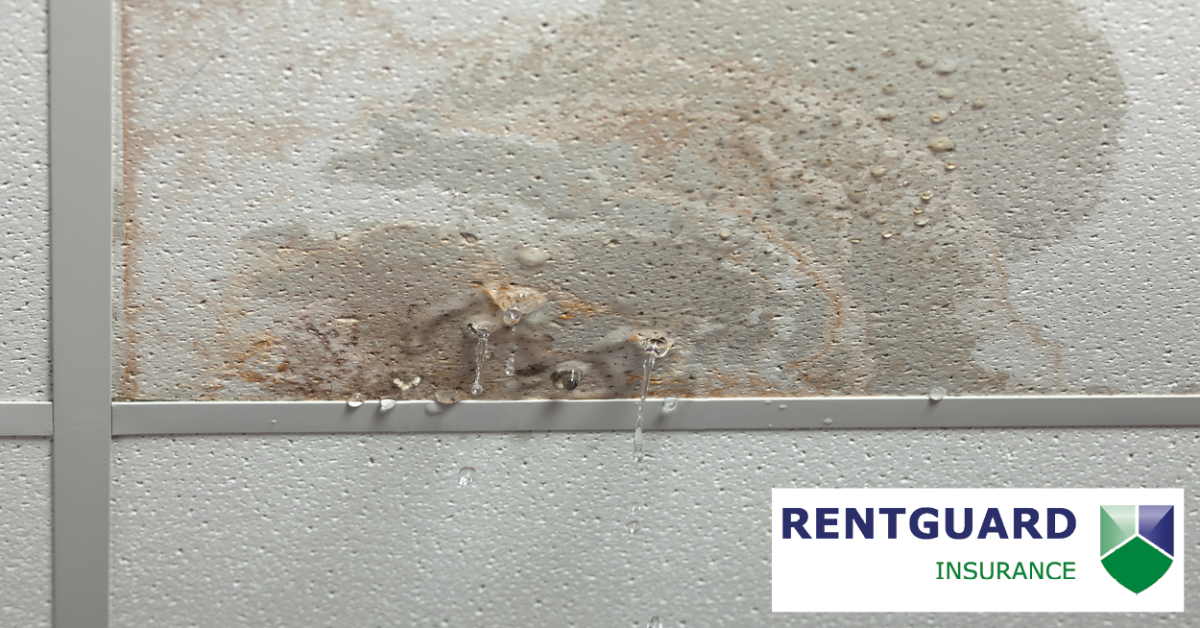

Tips for your tenants - How to spot signs of escape of water
Escape of water is the unintended release of water from plumbing, heating, or domestic appliances. It can cause significant damage to buildings and their contents and it can be vital to catch these signs early to help avoid extensive loss and damage.
It can be a common problem - the Association of British Insurers say insurers pay out £1.8 million for escape of water every day (1). The longer escape of water goes untreated, the more costly it can become.
Here we set out how tenants can play a part in preventing water leaks and what they can do to ensure a leak is spotted before it becomes a bigger problem.
What is escape of water?
- Regularly inspect the property for signs of leaks or moisture.
- Check under sinks and around toilets for any signs of leaks.
- Regularly clean gutters and downspouts to ensure proper drainage of water away from the property.
- If the property has a sump pump or basement, inspect it regularly to ensure it is working correctly and there are no signs of moisture.
- Avoid flushing anything other than toilet paper down the toilet, as items like paper towels and feminine hygiene products can cause clogs and backups.
- If the property has a dishwasher or washing machine, inspect the hoses and connections regularly to ensure they are in good condition and not leaking.
- Check where the main stopcock is located and how to turn off the water in case of an emergency.
Escape of water signs
Looking for any warning signs such as leaks, cracks or noises can help to identify a problem before it escalates, potentially saving you thousands of pounds in repairs and lost revenue.
Here are some signs of a leak for you or your tenants to look out for:
- Water stains: Look for water stains on walls, ceilings, or floors. These may appear as discolouration, peeling paint, or bubbling wallpaper.
- Musty smell: If you notice a musty or mouldy smell, this could be a sign of water damage.
- Dripping sounds: If you hear dripping sounds, this could be a sign that water is leaking somewhere.
- High water bills: If you notice an unexplained increase in your water bill or your water metre is rising, this could be a sign of a leak.
Help prevent leaks from getting worse
If they notice any of these signs, there are some steps that can help prevent the leak from getting worse. Here are some examples:
- Turn off the water: Locate the main stopcock or an internal stopcock in places such as under the kitchen and bathroom sinks. Make sure your tenants know where to find it.
- Catch the water: Place a bucket or other container under the leak to catch any water that is dripping.
- Dry the area: Use towels or a wet/dry vacuum to remove any standing water and dry the affected area as quickly as possible. This can help prevent mould and mildew growth.
- Check your insurance policy: Contact your insurance provider as soon as possible to report an insured event and make a claim. It’s important to follow the terms and conditions in your policy wording to help prevent a claim from being rejected.
What landlords can do to help prevent escape of water
Roofs, guttering and drains should all be kept in good working order, particularly after heavy rain, storms or snow.
Landlords are responsible for the repair and maintenance of a property's structure, internal fixtures and fittings, and landlord contents. However, if tenants are responsible for garden upkeep, they should be mindful of fallen leaves clogging drains and guttering.
Regularly service the boiler
As a landlord, you are legally required to arrange annual gas safety inspections (2) on appliances but you may also want to arrange routine checks of the boiler more frequently. This can help prevent boiler failure, which could leave your tenants with no heating and/or hot water.
Protect your property in winter
Water damage can be a problem particularly in winter. If the property is not suitably heated, pipes may freeze and become susceptible to bursting when they thaw.
You may want to add a clause into the tenancy agreement setting out any essential precautions the tenant needs to take during cold weather. If a spell of freezing weather is imminent, you may wish to remind tenants to set the thermostat accordingly if they go away. Leaving the property suitably heated can help prevent frozen pipes at times when water is not regularly flowing through them.
You should also check your insurance policy for any heating clauses. If the water supply is not turned off and water systems drained, some insurers require the central heating system to be set to operate continually at a minimum temperature throughout the months of November, December, January, and February. Read your insurer’s policy wording to check the terms and conditions of your insurance.
Keep in contact and check the condition of the property
Ensure your tenants know who to call in an emergency. Provide up to date contact details for you or the letting agent if you use one.
Carrying out periodic inspections can help catch a leak before it gets worse, but it’s important to comply with the law (3). Landlords must ask for permission from tenants before entering the property.
Download our guide on how to spot signs of escape of water below
Help is at hand – get in touch with Rentguard
With vast experience handling insurance policies for a wide range of landlords, and with relationships with a number of leading insurers, Rentguard Insurance aims to simplify your insurance arrangements and help to protect your property, its contents, and your liabilities.
Get a quote online or speak to our specialist team on 0333 000 0169.
(1) https://www.abi.org.uk/products-and-issues/choosing-the-right-insurance/home-insurance/burst-pipes-and-water-leaks/
(2) https://www.hse.gov.uk/gas/landlords/
(3) https://www.nrla.org.uk/resources/managing-your-tenancy/accessing-the-property-during-a-tenancy

